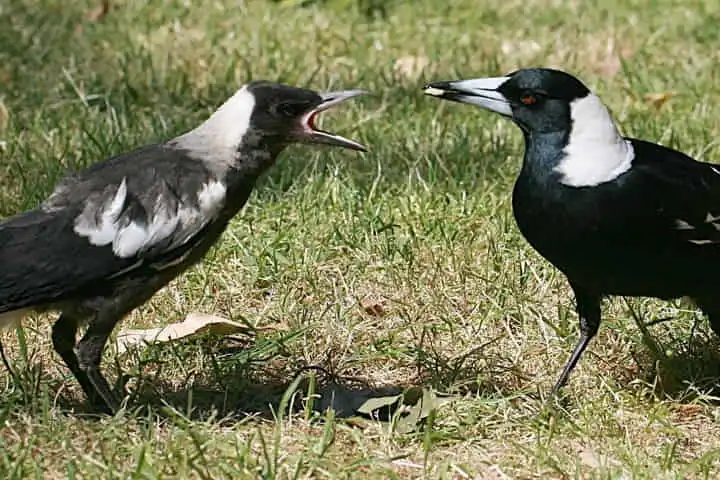

Highly intelligent creatures, Australian magpies are known to live in groups and cooperate with each other in different activities (Pic. Courtesy smithsonianmag.com)
<p>
<strong>Even best laid experiment plans can go awry but they still help scientists to learn something! This is what happened when researchers with the aim to know more about social interaction and movements of Australian magpies put small GPS tracking devices on them, mentions a report in smithsonianmag.com.</strong></p>
<p>
The Australian magpies aka Gymnorhina tibicen were smarter than the researchers as they aided each other to take apart and unfasten their trackers. This type of cooperation reflects selfless conduct on the part of the birds which has been rarely observed in them. Gizmodo&rsquo;s article states that this instance offers ample proof of problem-solving ability and collaboration among the social species.</p>
<p>
<iframe allow="accelerometer; autoplay; clipboard-write; encrypted-media; gyroscope; picture-in-picture" allowfullscreen="" frameborder="0" height="315" src="https://www.youtube.com/embed/E2IJQc-MGDs" title="YouTube video player" width="560"></iframe></p>
<p>
The details of this study published in Australian Field Ornithology is the first instance of an avian species removing their GPS tracker deliberately. Action of one creature that helps the other to escape a perilous situation even though it does not benefit the former is described as cooperative rescue behaviour and this has been noticed in wild boars, rats and other bird species like Seychelles warblers. The last are known to help each other by removing sticky seeds that damage their flying and can even cause death.</p>
<p>
<strong>Also read: <a href="https://www.indianarrative.com/science-news/smart-male-sparrows-shuffle-their-playlist-to-woo-females-151124.html">Smart male sparrows shuffle their playlist to woo females!</a></strong></p>
<p>
The authors of the study suggest that their paper is the first to record rescue behaviour in magpies.</p>
<p>
The original plan of the scientists was to conduct a pilot study to know how the magpies, the highly intelligent birds socialise, how far do they fly, if their movement had any pattern or schedule, and how their daily pursuits were influenced by sex, rank and age, conveyed the author of the study, Dominique Potvin.</p>
<p>
Potvin is an animal ecologist at Australia&rsquo;s University of the Sunshine Coast.</p>
<p>
Another objective of the study was to test the efficacy of the new tracking device that was to be fitted on birds ranging from medium to small size. The plus point of these trackers was that these could be charged and their data downloaded wirelessly, thus eliminating recapturing of the birds.</p>
<p>
With these aims in view, the team of researchers fitted on five magpies a small backpack-like harness attached to the tracking device. Weighing less than a gram, these trackers were fastened to a rigid harness and could be released with a magnet. The birds with the trackers, who had been trained previously, would be lured to an outdoor ground &quot;feeding station&quot; to enable the scientists to charge the trackers wirelessly while downloading the data.</p>
<p>
Proving how best laid plans can go awry, within 10 minutes after the tracker device was put in place, the fifth bird, a female of considerable intelligence but without a tracker started picking at the harness of a bird younger to her. Her efforts paid off and this act was repeated in the following hours. Three days into the experiment, the birds had managed to remove a tracker off one dominant male.</p>
<p>
<strong>Also read: <a href="https://www.indianarrative.com/science-news/clever-parrots-use-golfing-skills-to-get-a-treat-149512.html">Clever parrots use golfing skills to get a treat!</a></strong></p>
<p>
What the scientists are not sure about is if it was the same female who detached all the harnesses or was it a joint effort involving others. Still, it is an example of rescue behaviour. What the team suspects is that it was the beaks that were used by the birds to clip and pull at the harness.</p>
<p>
Magpies, known to be very social, live in groups that may vary between two and 12 who collaborate to protect, occupy and breed cooperatively. These birds have high levels of cognitive ability for solving problems.</p>
<p>
The researchers feel that the magpies perceived the tracker as some sort of parasite that had to be undone and factors like these need to be kept in mind while designing experiments in future.</p>
<p>
Summing up this experience, Potvin told the Conversation: <a href="https://www.smithsonianmag.com/smart-news/sneaky-magpies-outwit-scientists-by-removing-tracking-devices-180979634/?utm_source=smithsoniandaily&amp;utm_medium=email&amp;utm_campaign=20220225-daily-responsive&amp;spMailingID=46458966&amp;spUserID=MTI4MDgxMTczNjcwMgS2&amp;spJobID=2182891929&amp;spReportId=MjE4Mjg5MTkyOQS2" rel="nofollow">&ldquo;Just like magpies, we scientists</a> are always learning to problem solve. Now we need to go back to the drawing board to find ways of collecting more vital behavioural data to help magpies survive in a changing world.&rdquo;</p>
Taiwan's Ministry of National Defense detected four Chinese naval vessels operating around its territorial waters…
India abstained from voting on the United Nations General Assembly (UNGA) resolution on the situation…
By Shalini Bhardwaj A government-appointed expert committee in Karnataka has found no evidence linking COVID-19…
BRICS leaders convened in Rio de Janeiro for the 17th BRICS Summit from July 6…
Vietnam's Ambassador to India, Nguyen Thanh Hai, highlighted the strong cooperation between Vietnam and India,…
Leaders of the BRICS nations welcomed Indonesia as a member of the group, while 10…